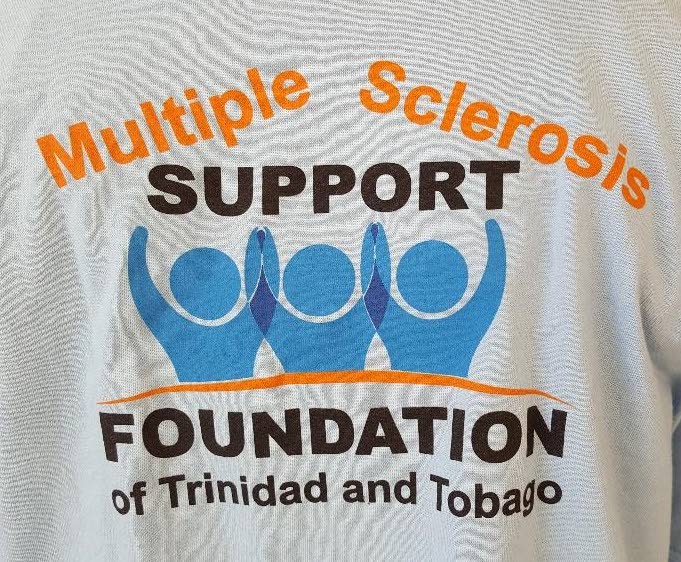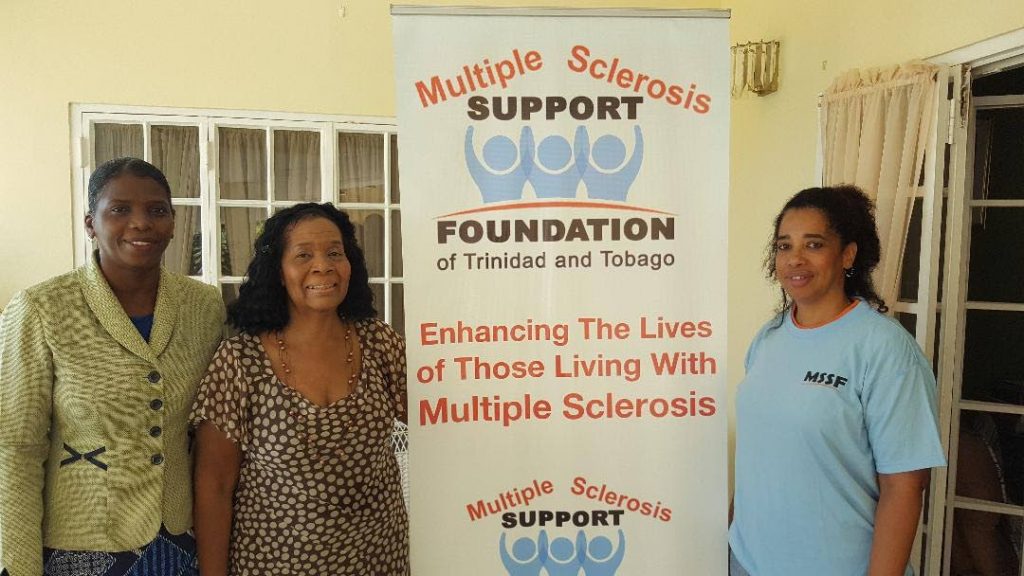Life with MS

At age 42, Gillian Rodulfo’s legs began to go numb. They then started to tingle and the soles of her feet grew hot.
Some people suggested that, as a driver, it was her constant sitting and pressing of the clutch and pedals that was causing her issues.
Eventually she went to see a doctor and, after some tests, he diagnosed her with fibroids saying they were resting on some nerves in her back and causing the problems in her legs. He recommended a hysterectomy.
However, Rodulfo’s mother thought the diagnosis was not adding up and insisted that she visit a gynaecologist.
The gynaecologist determined that, while she had fibroids, they had nothing to do with the problems in her feet. He then instructed her to get an MRI and, when the results came in, sent her to a neurologist.
She was diagnosed with multiple sclerosis (MS) in 2013, two years after she started getting symptoms.
Rodulfo said she had to stop working as her condition got progressively worse.
At the time of her diagnosis, she had lost control of her bowels and her motor skills. She said it was as if she had a stroke as it mostly affected her left side. She was hospitalised for two weeks and was started on medication.
“I became depressed and angry because, ‘What is this madness?!’ I had never heard of MS before. I thank God I had a good support system with my mother, my brothers, and cousins who did research and helped me along this journey to be where I am today because I couldn’t do anything for myself.”
Since then, Rodulfo’s condition has improved as she can now walk, feed herself, and even drive again. She believed her initially recovery was through willpower and faith. She said seeing her in that condition was affecting the health of her mother and she refused to be the reason for her mother’s death.
After making that decision, she improved significantly, so much so that she was discharged from the hospital within two days.
“Recovery is a holistic thing. You need to identify and accept what’s going on, trust in God that there is a reason this happened to you, that there is a message to you or others to grow.”
She expressed appreciation that the medication was free to MS patients because they were very expensive, and she knew that many people would not have been able to afford it on their own. She also thanked the Multiple Sclerosis Support Foundation of TT for its support, advice, and free treatments.
However, in addition to the medication, she changed her diet and lifestyle. She said long-term use of the drugs can affect the internal organs so she took supplements to boost and help protect her liver, kidney, and other organs.
She stressed that MS did not affect everyone in the same way. In her case, her body did not regulate her body temperature so when it was cold, she perspired.
She also feels no pain. Her skin is numb so that if she was hurt she would be aware of it unless she bruised or bled.
WHAT IS MS?
MS is an auto-immune disease that erodes the lining of the nerve cells in the brain and spinal cord.
The body’s immune system attacks the lining which protects the nerves, and without it the nerves are exposed and could become damaged. This interferes with the function of organs and tissues as the brain can not correctly send signals to the body.
Since the disease attacks the nervous system, the symptoms are wide in range.
They could include muscle weakness, numbness, pain, loss of coordination, partial or complete loss of vision, burning or cold in parts of the body, slurred speech, fatigue, dizziness, problems with bowel and bladder function, and more.
President and co-founder of the Multiple Sclerosis Support Foundation of TT, former member of Parliament and senator Dr Daphne Phillips, also has MS.

Phillips, who was a Minister from 1995 to 2001, said her symptoms started in 2000 but she was not diagnosed until 2004, when she got her second attack.
She recalled that once she felt as if someone was squeezing her chest so tightly that she could barely breathe. The doctor later explained that it was because the nerves in her diaphragm were malfunctioning. During her last attack, which occurred several years ago, she could not touch anything metal without being shocked. It would even spark. However, generally, her right side was affected by weakness and her mobility had been gradually declining so that she now uses a walker to get around. She said she took medical treatment for three years, which cost $10,000 a month, but she no longer takes MS medication. Instead, she is now very careful about her diet and exercise, gets regular massage and physiotherapy, takes vitamin and mineral supplements, and prays.
Phillips said she, the foundation’s secretary Patricia Jaggasar-Clement, John Bateau and Jessie-May Ventour registered it as an NGO in May 2017. She said they pooled their ideas and concentrated on meeting the needs of people with MS. “What we need is professional services in physio-and massage therapy, and most of those patients can not afford the cost. We wanted to do things for them and we wanted them educated on MS.”

Among other things, the foundation provides workshops to help them improve their lifestyle, access to free massage and occupational therapy, peer counselling, transport to social services and to the hospital, and disseminates information to assist in the understanding of the disease free or at a reduced cost.
“Some people, when they get the symptoms, they simply don’t know what it is. They never heard about it before. It’s just so scary because the symptoms could be severe.”
Jaggasar-Clement added that the organisation supports those with MS in very practical ways such as carrying them for groceries, helping them to get their medication, visiting them at the hospital, and even helping them access government grants.
She said some members became depressed so they also have a group chat where they shared jokes, and encouraged and supported each other. She said the workshops were also for the family, friends and caretakers of those with MS as it can be difficult to see them fight to do things they could have easily done before.
“They call themselves warriors because every day it’s a fight. Sometimes it’s a fight just to get off the bed. They inspire me so that even if I have a headache or some other pain, I won’t stop that from doing what I have to do because they don’t.”
Phillips said continuous stress, possibly small things over a period of time, rather than a few very stressful events, could trigger MS in an adult. She also believed there was a connection between people’s thoughts, emotions, and psychology, and their physical condition.
“I think how you feel about yourself affects what’s happening to your body. I saw some research from the US and I want to do some research as to whether MS has a psychological connection to childhood experiences, before age seven or so. If you felt or were made to feel bad about yourself, not necessarily abuse, but how your parents treated you, how you were made to see yourself from that early age. Those with negative experiences at that age may experience MS in later years when they become stressed.”
Although World MS Day was celebrated internationally on May 30, the MS Support Foundation of TT celebrated it yesterday at the Marriott Hotel, Port of Spain. There, they hosted a seminar, and unveiled the foundation’s new website, honoured some of their members and supporters, and Phillips presented her research on MS.


Comments
"Life with MS"